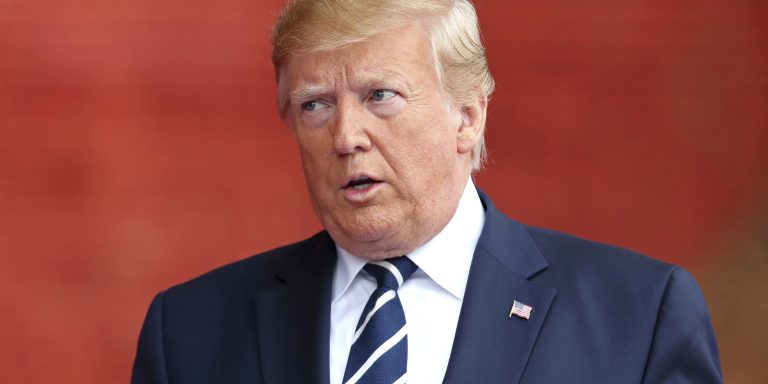INTELBRIEF
May 7, 2021
IntelBrief: Implications of Trump’s Extended Facebook Ban

Bottom Line Up Front
- An Oversight Board responsible for reviewing Facebook content determinations upheld former President Trump’s Facebook ban.
- The Oversight Board did, however, leave room for Facebook to re-examine its policies to determine whether an indefinite ban is appropriate.
- One of the Oversight Board’s nine recommendations included the need to develop more transparent policies regarding decisions to restrict accounts.
- None of the Oversight Board’s recommendations focused on technical challenges (e.g. AI/ML tools) that Facebook should adopt in tandem with human-led policy/procedural solutions.
On May 5, 2021, Facebook’s Oversight Board – a body established by Facebook to provide independent review, comprised of academics, journalists, and lawyers – determined that Facebook’s indefinite suspension of former President Donald J. Trump from its platform was justified. The Oversight Board reviewed Facebook’s January 7 decision to suspend President Trump from using the social network, which was made under the heavy shadow of the January 6 Capitol insurrection. Facebook’s determination was rooted in the company’s assessment that Trump’s continued access to its social media tools would possibly continue to inflame an already tenuous situation, leading to further incitement of violence. At the time, Facebook founder Mark Zuckerberg explained the decision to suspend Trump by noting, “we believe the risks of allowing the President to continue to use our service during this period are simply too great.” The Oversight Board agreed with this assessment and highlighted two posts by Trump that “severely violated Facebook’s Community Standards.” At the same time, however, the Oversight Board noted several deficiencies in Facebook’s process and procedures related to its ban of Trump.
The Oversight Board made nine recommendations that may, inter alia, improve transparency, accountability, and consistency in implementing and enforcing community and safety standards across the Facebook enterprise. Specific to President Trump’s suspension, the Oversight Board was clear that the company’s “indeterminate and standardless penalty of indefinite suspension” was inappropriate. And, as such, the Oversight Board placed the onus on Facebook by mandating that the social media company reexamine the ban against President Trump in six months. In this context, as Facebook reevaluates the ban, the Oversight Board’s recommendations are certainly going to be layered into the decision. Specifically, the recommendations around transparency regarding the need for Facebook to provide “users with accessible information on how many violations, strikes, and penalties have been assessed against them” is particularly relevant. Users who end up in “Facebook jail” are often unaware of the reason for the enforcement action levied against them. Moreover, the Oversight Board’s recommendation that Facebook explain its strike and penalty process in its Community Standards/Guidelines pages will improve transparency. This recommendation could serve as a deterrent – one where a user may think twice about posts that could run afoul of standards and guidelines. The Oversight Board’s emphasis on the need for Facebook to refine the process, procedures, and clarity of bans, as well as their durations, portends a potential future Facebook homecoming for President Trump.
The Oversight Board’s decision has simply delayed the inevitable return of former President Trump to Facebook and Instagram. Despite this, there are perhaps other atmospherics surrounding the interplay between Facebook and the Oversight Board that are more important than Trump’s access to social media. First, an independent board that can issue recommendations – which, even if not binding, serve an important educational and public communications purpose – can change the way social media companies interact with their users and may improve online experiences. Instead of “black-box” decisions often shrouded in mystery, users may earn the transparency they deserve. Second, other social media companies might consider adopting a similar oversight board model like Facebook to better improve transparency. Third, the Facebook Oversight Board’s crucial recommendation that Facebook carry out a comprehensive review of its role in spreading 2020 Presidential election disinformation that exacerbated tensions in the United States may result in continued policy amendments by Facebook that may further mitigate (but not eliminate) the use of the platform by malign actors.
The Oversight Board’s recommendations will also reverberate beyond the borders of the United States. For instance, the recommendation regarding the need for Facebook to improve its human rights policies could have large-scale impact if it prompts further action, especially in the context of instances where Facebook may have played a facilitative role in the grave violations of international criminal, human rights, and humanitarian laws. This recommendation calls to mind how Facebook was used to incite violence in Myanmar that resulted in the Rohingya 2016-2017 genocide. In a clear nod to Facebook’s global impact, the Oversight Board also made clear in another recommendation that Facebook needs to develop, “adequate resourcing and expertise to assess risks of harm from influential accounts globally.” The implication in this recommendation and another that calls for the hiring of specialized staff with linguistic and cultural expertise is that Facebook as it is currently resourced is not up to the task of countering misuse of its platform – anywhere. Finally, not one of the Oversight Board’s nine recommendations point to the need for developing technological solutions to address Facebook’s longstanding weaknesses (e.g. disinformation, lack of transparency, incitement). A recommendation on dealing with some of the algorithmic issues that feed the disinformation cycle would have been welcomed. Instead, every recommendation focuses on the need for human-driven solutions, such as policies, procedures, governance, or simply the need for new specialized personnel. The Oversight Board's reluctance to take a firm and final position on Facebook's decision to ban Trump is understandable given the delicate balance between speech moderation and speech that may potentially cross the threshold of inciting violence. That question is now left for Facebook to adjudicate. If history is any indication, that line will remain blurred.